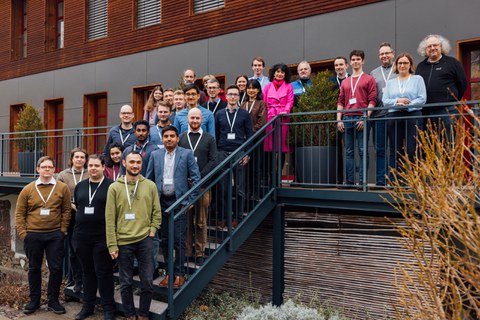Jan 30, 2023
Ramping up education and research in artificial intelligence (AI)
The School of Embedded Composite Artificial Intelligence (SECAI) at TU Dresden and Leipzig University welcomes the first cohort of its Graduate School
The start of the year also marked a new beginning at SECAI, as the DAAD-funded Konrad Zuse School of Excellence in Artificial Intelligence welcomed it’s first class of early-career researchers. Over the next few years, they will gain new insights with their research on AI in computer science, electrical engineering and medicine, and use these to develop new methods. The doctoral students’ and clinical researchers’ areas of expertise ranges from the development of new AI methods by compositing the advantages of previously incompatible principles to the embedding of AI algorithms in tailor-made microelectronics and intelligent devices. For example, Deianira Fejzaj, doctoral student at SECAI, is conducting studies on “2D-material-based synapses for neuromorphic computing” with the ultimate goal of transferring human brain mechanisms to microelectronics.
On January 26, 2023, the thirteen doctoral candidates and clinical researchers came to Leipzig to network and engage with the academic fellows and scholarship recipients from SECAI for the first time. The presentations held by academic fellows made up the thematic highlights of the day. For instance, with his lecture “Brain-Computer-Interface: From Stroke to Rehabilitation to Consciousness Detection,” Prof. Martin Bogdan provided a glimpse into the research he and his team are conducting that combines AI algorithms with medical technology to improve the rehabilitation of stroke patients and to better monitor and understand consciousness, especially in patients suffering from locked-in syndrome. The lecture illustrated how important the interplay of SECAI’s research areas is, in particular that of medicine, computer science and ethics. In addition to the specialist lectures, the participants had the opportunity to chat personally with each other and get to know the range of expertise and personnel at SECAI. The School combines not only five areas of research, but with TU Dresden, Leipzig University and the EKFZ, it also brings together three research institutions and an international team of scientists.
“The challenge in artificial intelligence is that it necessarily presupposes the interplay of many ideas and technologies,” says Prof. Markus Krötzsch, Director of SECAI. “In order for a system to appear intelligent to us, algorithms, data and hardware must all be well coordinated. That’s why we at SECAI want to bring people together who research AI from completely different perspectives and who are not afraid to forge new paths and break away from the mainstream.” With this in mind, it’s safe to say that this year’s launch was a success. “We have an impressive spectrum of talents and skills, as well as specific ideas for our joint research,” Krötzsch happily reports.
“Bioinformatics and life sciences on the whole are no longer imaginable without machine learning (ML) and artificial intelligence (AI). However, ML and AI applications in this area are also faced with special circumstances: This affects both the technical side of things – especially the availability and complexity of data – as well as the ethical questions, in particular with a view to medical data,” adds Prof. Peter Stadler, Deputy Director and Head of the Chair of Bioinformatics at Leipzig University. In Leipzig, one particular focus within SECAI is on top-level research for using AI in life sciences and personalized medicine. “SECAI provides us the unique opportunity, especially for this critical area, to systematically train highly qualified specialists,” Stadler underscores, referring to the early-career researchers at the school.
SECAI is one of the three DAAD-funded Zuse Schools for promoting education and research in artificial intelligence (AI) in Germany. One of SECAI’s key concentrations is the research of intelligent solutions in medicine, ranging from assistive robots to the development of personalized medication. Furthermore, SECAI is looking into the opportunities for and the implications of using AI in computer science, electrical engineering, law and society. The idea of the project partners TU Dresden and Leipzig University is based on the close interconnection of studies, research and application, which opens up manifold career paths to talented young individuals to use and develop AI in society and industry. The excellent interdisciplinary research conducted at both partner universities is ideally complemented by the particular strengths of Saxony’s technology hubs of Dresden and Leipzig.
Contact:
Philipp Hanisch
Scientific Coordinator of SECAI
TU Dresden
+49 351 463 43506

